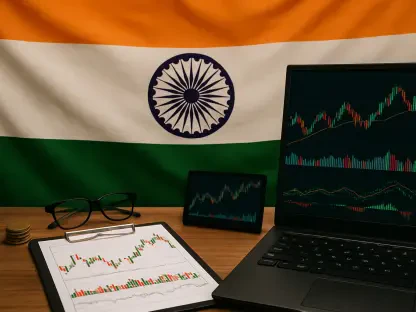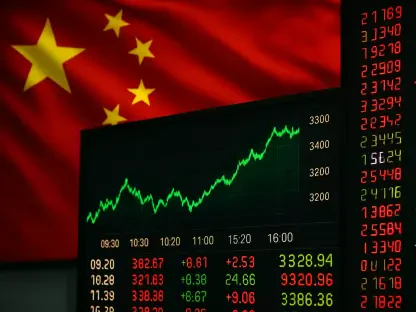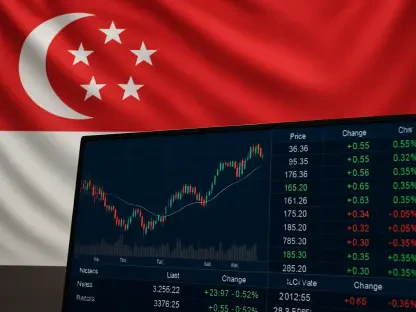As global markets grapple with evolving trade dynamics, the looming uncertainty of U.S.-India tariffs casts a significant shadow, particularly impacting sectors in India heavily reliant on exports, such as pharmaceuticals and IT. With the potential imposition of tariffs as high as 200% on pharmaceuticals and 27% on a mix of Indian goods, the situation poses significant challenges and opportunities for strategic adjustment. The situation compels a critical re-evaluation of investment portfolios, with industry experts suggesting a timely pivot towards defensive sectors. Among them, the fast-moving consumer goods (FMCG) sector emerges as a robust sanctuary for investors in times of trade volatility, offering stability anchored in India’s resilient domestic consumption patterns. This shift stems from the fact that FMCG stocks thrive on local demand, especially during climatic cycles like the monsoon, which bolsters the consumption of essentials. Overall, the domestic-oriented FMCG sector presents a formidable alternative, relatively insulated from global trade disruptions, appealing to investors seeking refuge from the unpredictability of international trade policies.
The Case for FMCG Sector Resilience
Economically, FMCG companies derive a significant portion of their revenue from domestic markets, largely insulating them from global trade shocks. This domestic focus positions them strongly amidst tariff uncertainties, as their performance is tightly linked to local consumer behavior rather than fluctuating international trade tides. Leading companies in the FMCG sector, such as Godrej Consumer Products and Hindustan Unilever, leverage their established market presence, organic demand, and comprehensive distribution channels focused on fast-moving essentials like soaps, personal care products, and packaged foods. During peak consumption periods like the monsoon, these companies see a surge in demand, solidifying their position as resilient stalwarts in an otherwise turbulent market environment. The sector’s strength is further buoyed by its ability to strategically adjust prices, thereby offsetting inflationary pressures without compromising profitability, making it an attractive proposition for cautious investors.
Moreover, the FMCG sector exemplifies adaptability, particularly in its capacity to navigate operational cost pressures through strategic pricing strategies. By passing some of the increased costs to consumers, these companies adeptly maintain their margins, a crucial maneuver that supports their financial stability. The inherent nature of FMCG goods, serving as day-to-day essentials, ensures that demand remains relatively inelastic, shielding these businesses from sharp downturns even as broader economic conditions fluctuate. This characteristic underscores the sector’s reliability, contrasting sharply with the vulnerabilities experienced by more export-dependent industries. As a result, investors are directed towards embracing such defensive equities, which promise both steady earnings and potential capital appreciation amidst fiscal unpredictability and tariff-induced anxieties gripping other segments of the market.
Navigating Sector Rotations amid Tariff Concerns
In anticipation of challenging trade environments, strategic sector rotation emerges as a prudent strategy for investors, prompting a measured withdrawal from volatile, tariff-exposed industries into safer harbors like FMCG. This tactical adjustment, relying on the predictable consumption patterns within India’s burgeoning domestic market, aligns with an overarching theme of refocusing investment efforts toward intrinsic growth sectors. In recent years, shifts towards these defensive equities have proven effective, moderating exposure to geopolitical and financial risks while fostering opportunities for sustained growth. The FMCG sector’s predictability, coupled with India’s steady economic growth trajectory and expanding consumer base, assures investors of consistent returns, cushioned against the unpredictabilities inherent in global trade wars.
Strategic repositioning also extends into considerations of diversifying risk portfolios away from BRICS-linked economies, where exposure to geopolitical events and energy market volatilities is prevalent. Herein lies the allure of FMCG equities, as their independence from foreign energy imports protects against the cascading effects of embargoes or policy shifts in energy trade partners like Iran, Russia, and Venezuela. In this light, FMCG investments are not merely defensive tactics but strategic endeavors aimed at capturing sustainable growth prospects within India. In effect, they provide an attractive alternative for investors mitigating against broader economic downturns while aligning with domestic consumption-driven dynamics.
A Comprehensive Strategy for Trade Uncertainties
In the landscape of global trade, the uncertainty surrounding U.S.-India tariffs is a pressing concern, especially for India’s export-dependent sectors like pharmaceuticals and information technology. The threat of imposing tariffs as steep as 200% on pharmaceuticals and up to 27% on a variety of Indian products presents formidable challenges. This situation urges industries and investors to reassess their strategies, prompting a shift toward more defensive sectors. Notably, the fast-moving consumer goods (FMCG) sector stands out as a stronghold for investors amid trade uncertainties, offering stability through India’s robust domestic consumption. This transition is fueled by the consistent demand for FMCG products, which is further amplified during cyclical events such as the monsoon season, enhancing the consumption of essential goods. Thus, the FMCG sector, being largely domestic-focused, is relatively shielded from the turbulence of international trade disruptions. It offers a reliable refuge for investors who are cautious of the unpredictable nature of global trade policies.









